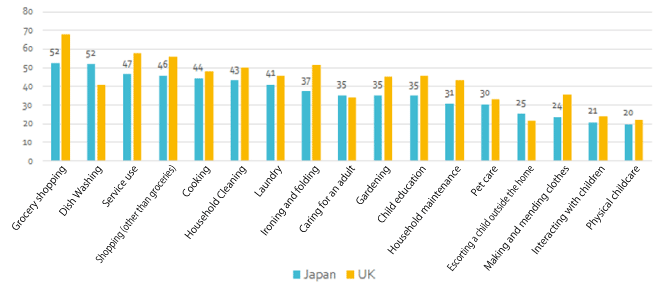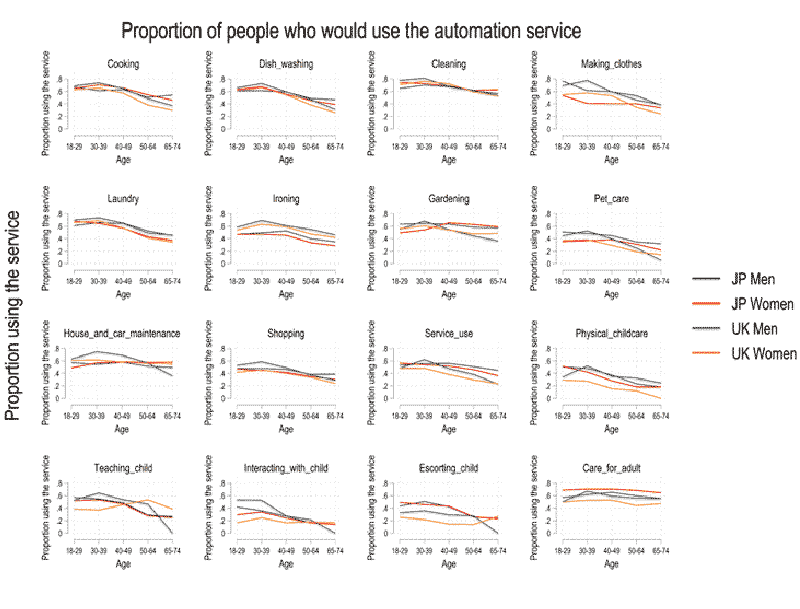Research Results
AI will transform approximately 40% of household work to automation
Joint Japan-UK Research Project on Forecasting the Future of Unpaid WorkFY2024

- NAGASE Nobuko (Professor, Faculty of Core Research, Ochanomizu University)
- RISTEX
- Principal researcher (2019–2023) “The Future of Unpaid Work: AI's Potential to Transform Unpaid Domestic Work in the UK and Japan” within the Human-Information Technology Ecosystem
First-ever quantitative prediction of the future of unpaid domestic work
The future of work is a critical theme in both research and policy discussions. Yet, the majority of past discussions have primarily focused on paid work, despite the fact that, on average, people in developed countries spend roughly an equal amount of time on unpaid work. A research group led by Professor Nobuko Nagase from the Faculty of Core Research at Ochanomizu University has broadened this discussion to include unpaid household work, forecasting its future using methodologies from sociology and economics.
In this study, the research group surveyed 29 British and 36 Japanese AI experts, asking them to estimate the extent to which 17 household and care work tasks could be automated in the future. According to the findings, the AI experts predict that, on average, 39% of the time currently spent on household tasks could be automated within 10 years. However, the Japanese male experts estimated that there was a significantly lower potential for housework automation compared to their British counterparts. This discrepancy implies the issue of gender inequality in Japanese households. These findings will serve as crucial evidence in policy discussions about the future of society. The high social impact of the research is underscored by its coverage by the BBC in the UK.*1
*1 Published on BBC
“Robots to do 39% of domestic chores by 2033, say experts” 22 February 2023
(https://www.bbc.com/news/technology-64718842)
Insufficient discussions on the potential changes in unpaid work due to AI and other automation technologies
Despite significant attention being paid in numerous countries, many studies on technologies, such as AI and IoT, and the future of work have predominantly focused on paid work, often overlooking the future of household work, child-rearing, and care work. However, in reality, unpaid work constitutes approximately the same amount of time as paid work in people’s daily lives. Thus, making predictions about these changes is clearly vital for future policymaking and investment activities.
Past technological advances have already reduced the time spent on unpaid work, such as household tasks, alongside paid work. For example, in the UK, the time dedicated to household chores like cooking, cleaning, and laundry significantly decreased from the 1920s to the 2000s. It is anticipated that new AI-based technologies will further accelerate this declining trend in the near future. Notably, domestic service robots, such as robot vacuum cleaners, are now the most widely manufactured and sold type of robots globally. This trend indicates a growing potential for machines to take over tasks, extending to the development of educational technology for children and AI-based care for the elderly at home. However, it is important to note that in Japan, the reduction in time spent on household work by housewives has been less pronounced compared to the UK.
Four projects for forecasting the future using social science methodologies
While many previous studies have focused on employment, excluding work types predominantly undertaken by women, no studies have attempted to quantify potential changes in unpaid domestic work. In response to this gap, the research group applied analytical methods used for forecasting the future of work to household tasks, child-rearing, and care work. This approach, utilizing survey data on in-home time use, enabled us to estimate the extent to which technology, including robots and apps, can replace human involvement.
The study was conducted through the following four projects.
<Project 1> Delphi survey*2
Engagement of Japanese and British experts to forecast to what extent housework automation will be achieved over the next 5 and 10 years
Their estimates suggest that 39% of household work will be automated within a decade. Notably, the Japanese male experts provided lower estimates than the British male experts. Furthermore, the projected automation of care work is less extensive than that in the case of general household tasks.
*2 Delphi survey
Questionnaire survey regarding future developments in science and technology.

Fig.1 Japanese and British experts’ forecasts on housework automation in 10 years
<Project 2> Virtual experiment
Employing the VIGNETTE study method*3, we explored the preferences of married men and women in handling housework under varying conditions. The experiment sought to understand their choices - whether to do the tasks themselves, delegate to spouses, use robots/apps, or hire housekeepers - in response to changes in their own working hours and pay, as well as variations in the service charges and productivity of these options.
In reality, notable differences exist in how men and women handle household tasks. Our experiment assessed how equalizing working hours, pay, and productivity between genders might influence their preferences. Findings revealed a general preference order: first themselves, followed by spouses, then robots, and finally housekeepers. The likelihood of choosing robots/apps increased with their affordability, higher productivity, and in cases where the respondents’ working hours and pay were greater, reflecting a trend towards economic rationality. In terms of child-rearing, the majority favored themselves or their spouses, while elderly care showed a similar pattern with a slight preference for housekeepers. No significant behavioral differences were observed that could be attributed to gender norms.
*3 VIGNETTE study method
A research technique. It involves the presentation of hypothetical scenarios to respondents to assess their likely positions, views, and decisions in those situations.
<Project 3> Survey on consumer willingness to use new robot/app technologies for 17 different household tasks
In this survey, we gauged the willingness of Japanese and British consumers to use robots/apps, considering their current working hours and pay. The same questionnaire was used for both groups. Overall, the willingness to use these technologies was high, particularly among young people and more so in the UK compared to Japan. However, in the 65 to 75 age range, Japanese respondents showed greater willingness than their British counterparts. Among younger generations, British individuals demonstrated higher willingness than their Japanese counterparts. Men exhibited greater openness to using such technologies for child care than women in UK. The results for care work were similar. Notably, Japanese women displayed a particularly high willingness to employ these technologies for care work.

Fig.2 Survey on willingness to use newly developed technologies
<Project 4> Survey on how the wider technology use discussed in Project 3 will impact the time spent on unpaid work
The aim of this project was to forecast future changes in the time spent on household work and child-rearing. To do this, we estimated the potential reduction in unpaid work time using representative studies on in-home time use from Japan and the UK, incorporating findings from Projects 1 and 3. Our results suggest that there could be a shortage of time for unpaid work, attributable to the declining Japanese working population dedicating extensive time to child and elderly care. The positive impact of technological developments in easing this constraint is expected to be more significant in Japan.

Fig.3 Projected reductions in household and care work time due to technological developments and their utilization
Simulations of future changes and proposals for social implementation of automation technology
Moving forward, we plan to utilize all the survey data presented in this report to conduct simulations. These simulations will explore various potential futures shaped by changes in robot prices and technology, as well as changes in pay and working hours between genders.
To address the lower expectations for domestic automation in Japan, our team of social scientists will collaborate with enterprise engineers and scholars in science and engineering. Together, we will develop proposals for the society-wide implementation of automation technologies.
